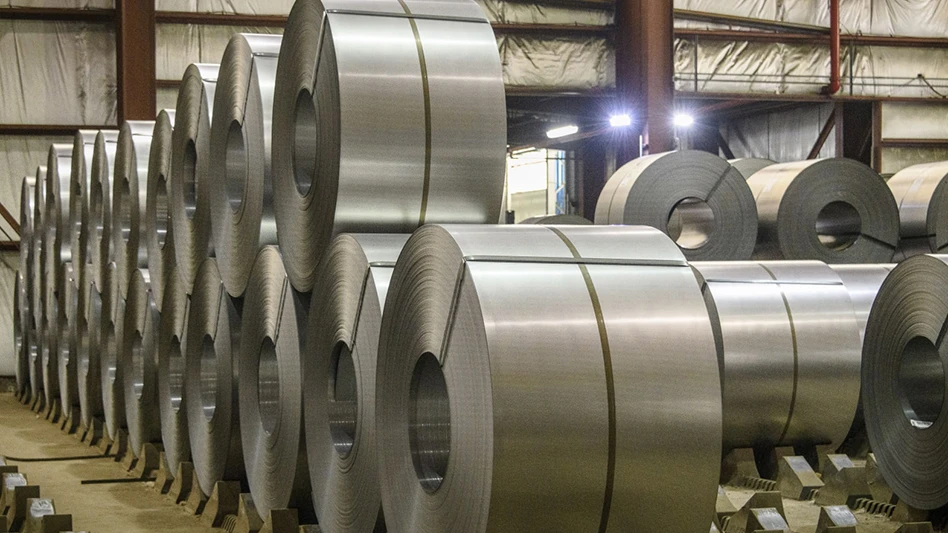When Recycling Today presented its list of the 20 Largest Tire Recyclers in North America in 2004, the intention was to
present the handlers and processors of tires who prepared the scrap material for end consumers.
Again this year, the majority of companies that handle large volumes of scrap tires are processors of whole tires who find varying end markets for the material, with the single largest one being the alternative energy market that consumes tire-derived fuel.
In most other recycling segments, those along the chain starting with collection and including processing and brokerage have adopted the label of recycler. The company operating the furnace or pulping mill at the end of the process is most commonly known as the consumer.
Michael Blumenthal, senior technical director with the Rubber Manufacturers Association (RMA), Washington, says the manufacturers of products that use the crumb rubber and tire shreds produced by scrap tire processors should reserve the "recyclers" label for themselves, since their ability to close the loop is what makes the rest of the processing steps feasible.
RECYCLER OR CONSUMER? It can be hard to quantify whether uniform terminology is important within an industry. An argument can be made, though, that as any business grows and becomes more global, the notion of "everyone speaking the same language" becomes critical.
In the longer-established metals and paper recycling industries, scrap processors, paper packers and haulers who collect and sort curbside material are generally known as recyclers.
The mills, foundries and smelters that melt or pulp the collected scrap have become known as consumers as far as the processing industry is concerned.
Whether everyone in the collection-processing-manufacturing loop is pleased with how the terminology has evolved is debatable. Paper making and metals producing companies that have invested hundreds of millions of dollars in equipment that allows them to turn scrap metal or paper into new products may wonder aloud whether they should rightfully be considered the recyclers of these materials.
| Overseas Attention |
|
A number of recent transactions have involved European companies purchasing or developing tire recycling assets in the United States. This March, Netherlands-based Granuband B.V. acquired Dash Recycled Rubber Inc. (DRRI) of Macon, Mo. The new subsidiary has been named Granuband-Macon LLC. According to a release from Granuband, "The company will continue the same activities with the personnel who are already employed at DRRI." Granuband’s three operations combined—two in Netherlands plus the newly acquired Missouri facility—recycle some 12 million PTEs (passenger tire equivalents) annually. The Granuband-Macon plant will produce several sizes of shredded rubber that can be used as fill material and as rubber mulch. RMD Americas LLC, Cocoa, Fla., has its roots in Spain but has been actively growing in the United States. In March of 2005, the company began setting up a manufacturing operation in Cocoa, Fla., designed to shred scrap tires it collects from sites throughout Florida RMD Americas is affiliated with Leon, Spain-based-RMD SA, a recycling company and manufacturer of tire shredding equipment. In July of 2005, RMD Americas acquired majority ownership in Martin’s Tire of Marion, Ky., and announced plans to expand one of its facilities. |
But as things stand with the accepted glossary, a broker or buyer in Asia most often uses a common terminology with trading partners in North America as to who is the consumer, the broker or the processor. A universal lexicon is in place.
In the still developing tire recycling sector, there may still be room for debate, and the RMA’s Blumenthal is among those who would like to see some discussion.
"Tire recyclers would be companies that make products out of the scrap tire stream," says Blumenthal. "It’s more than just semantics. If you look at the definitions from a third-party view, processing is not the same as recycling."
Blumenthal is reluctant to put makers of tire-derived fuel (TDF) into the recycling category. "That is energy recovery, but it is not recycling," he remarks. Similarly, he considers civil engineering applications as a form of re-use, but not recycling. "Making tires into new products such as rubber sidewalks or mats—that is a recycling activity," Blumenthal states.
He also acknowledges that there are some blurry lines as well. Blumenthal considers tires melted at electric arc furnace steel mills as a form of recycling since new steel is being manufactured, and he is uncertain where to put rubberized mulch or crumb rubber placed at athletic fields in the recycling spectrum, labeling them "in-between" markets.
Ultimately, Blumenthal says he is not out to alienate any of the critical steps in the recycling process. "We are all in the recycling business," he comments. "You can’t get there without the intermediate steps."
He is hopeful, though, that by allowing manufacturers who put the highest value on scrap tires to adopt the "recycler" label, this will help cause a greater separation between disposal and a marketable commodity. "We have to be very careful about what the view of the industry is and our level of credibility."
THE 2006 MODEL. In both the 2004 version of Recycling Today’s list of the "20 Largest Tire Recyclers in the North America" and in this year’s version, there is a mixture of companies in different parts of the recycling chain.
Since the list is based on the volume of tires handled, companies that collect scrap tires, or perhaps even clean up stockpiles and then process them into TDF or another marketable product are the most common type of business on the list.
Some of these companies engage in additional value-added steps in the process, including several that make crumb rubber and a few that create manufactured products.
Many of the same companies that appeared on the 2004 list are back for this year’s edition, although the one most notably missing is the former Recovery Technologies Group (RTG), Gutenberg, N.J. That company shuttered its operations and liquidated before 2004 had ended.
One of the few publicly traded companies on the list, GreenMan Technologies Inc., has been struggling to produce black ink on its balance sheet for the last couple of years and is now divesting itself of operations.
Although the company’s 2005 totals afford it a place on this year’s list, the sell-off of operations in Tennessee and Georgia will probably mean a major reduction in the number of PTEs it handles in the future. As the company continues to divest and write-down assets, speculation also centers on whether GreenMan can remain viable.
FUTURE THOUGHTS. One approach being considered for the future of this list is to create two separate lists—one for processors who shred whole tires and another for manufacturing companies that use tire shreds or crumb rubber to make new products.
On the positive side, this approach may help call attention to some of the manufacturers who did not make this list for volume reasons.
Among the challenges to consider, however, are whether to include some companies on both lists, and also whether TDF consumers such as cement kiln operators deserve to be part of one of the lists.
Readers interested in offering an opinion on how they would like to see this list presented in the future are urged to contact the author at btaylor@gie.net.
Additionally, readers who are aware of a company that should have appeared on this list or is a candidate for a future list are encouraged to call or e-mail the magazine.
Although there is plenty of room to debate just how this list should be presented, the magazine’s editors believe lists such as this one can help the industry have a clearer picture of who are the largest processors and recyclers of scrap tires.
For the full list of the 20 Largest Tire Recyclers in North America, follow the following link: 20 Largest Tire RecyclersThe author is editor of Recycling Today and can be contacted at btaylor@gie.net.

Explore the April 2006 Issue
Check out more from this issue and find your next story to read.
Latest from Recycling Today
- P+PB adds new board members
- BlueScope, BHP & Rio Tinto select site for electric smelting furnace pilot plant
- Magnomer joins Canada Plastics Pact
- Out of touch with reality
- Electra names new CFO
- WM of Pennsylvania awarded RNG vehicle funding
- Nucor receives West Virginia funding assist
- Ferrous market ends 2024 in familiar rut





